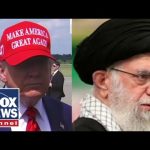A recent visit to the Middle East by a bipartisan group of U.S. lawmakers has stirred up discussions and concerns back home about America’s role in the ongoing turmoil in the region. Congressman Zach Nunn, a Republican among the delegation, has underscored the vital need for on-the-ground insights as the situation evolves. The Middle East is experiencing significant shifts, and lawmakers hope their visit will foster a spirit of cooperation and dialogue. Their mission? To advocate for de-escalation and encourage Iran to engage in diplomatic discussions rather than military confrontations.
Interestingly, as the lawmakers returned, the chatter in Washington grew louder concerning the potential for U.S. military action, particularly regarding Iran. Back on Capitol Hill, feelings were mixed, with some members of Congress uncertain about the need for a definitive stance on U.S. intervention. While there may be individuals who feel a more aggressive approach is warranted, others, like Congressman Ro Khanna, expressed frustration with Senate Majority Leader Chuck Schumer’s vague responses to inquiries about possible military engagement. It seems that politicians are finding it tough to navigate this convoluted situation without stepping on too many toes.
Republican lawmaker Thomas Massie even proposed a resolution aimed at preventing U.S. forces from bombing Iran, further illustrating the divide within Congress on the matter. On the other side, Democratic Senator Tim Kaine is looking to push for a vote on American involvement, indicating that the discussions are far from settled. There’s a delicate balancing act at play, especially when considering that President Trump has campaigned on an “America First” platform, prioritizing a hands-off approach to foreign conflicts.
Moreover, representatives on the trip to the Middle East reported that Gulf states are deeply concerned about the potential ramifications of any U.S. strike. While they recognize Iran’s nuclear aspirations as an existential threat, they are wary of the ripple effects that prolonged conflicts could have in their region. Pressure is mounting for all involved to find a way to de-escalate tensions and avoid drawing in additional nations, as prolonged warfare is never a recipe for stability.
Schumer’s position becomes even more complicated as he navigates the dual responsibilities of supporting Israel while also managing party dynamics. As the highest-ranking Jewish lawmaker, his stance involves defending the interests of a key ally while hesitating to hand President Trump increased authority. His struggle underscores the broader dilemma facing many lawmakers, who are attempting to balance national interests and party loyalty in a very volatile environment. It appears that as both sides of the aisle grapple with these complex issues, the focus remains on steering the conversation toward diplomacy rather than destruction.




